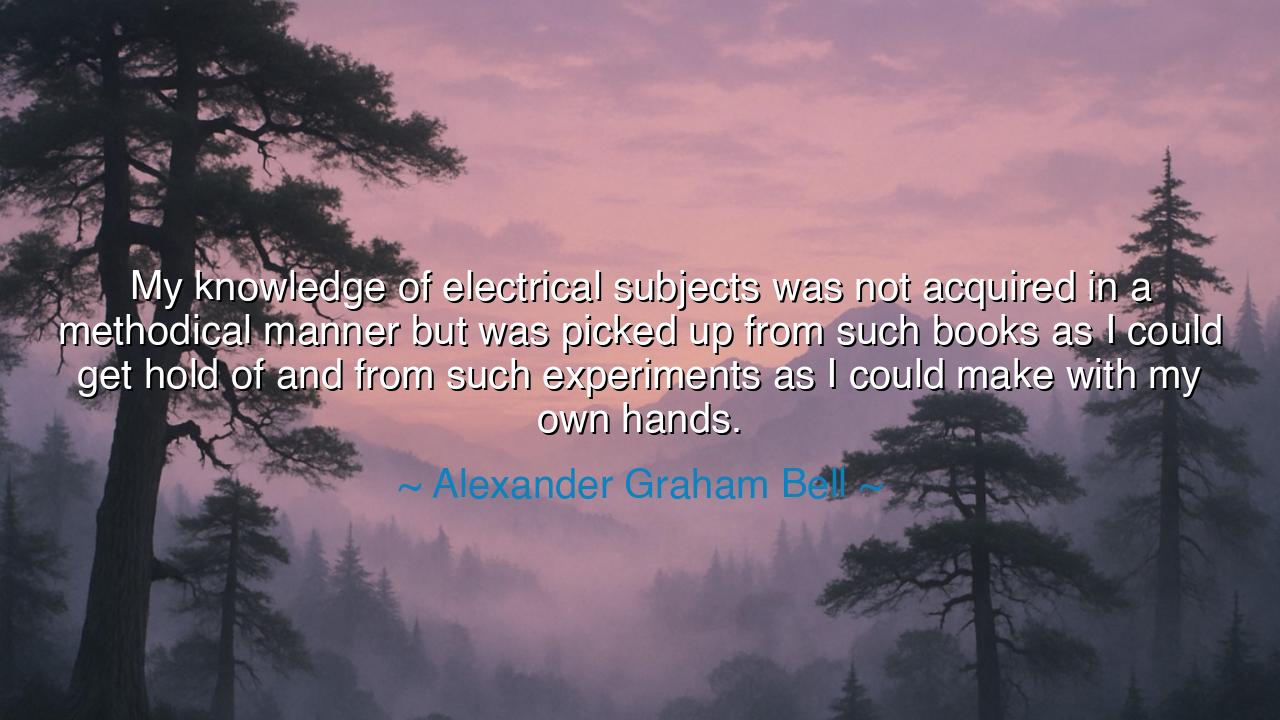
My knowledge of electrical subjects was not acquired in a
My knowledge of electrical subjects was not acquired in a methodical manner but was picked up from such books as I could get hold of and from such experiments as I could make with my own hands.






Alexander Graham Bell, the bringer of the human voice across wires, once confessed with humility: “My knowledge of electrical subjects was not acquired in a methodical manner but was picked up from such books as I could get hold of and from such experiments as I could make with my own hands.” These words carry not only the story of invention but also the eternal truth that genius is often born not in orderly classrooms, but in restless curiosity and in the daring to learn by doing.
The meaning of his declaration is simple yet profound. True knowledge is not confined to the narrow path of formal instruction. Bell did not inherit wealth of laboratories or a strict curriculum. Instead, he reached for whatever books lay within his grasp, and he tested their teachings with his own hands. In this, he reminds us that education is not the gift of institutions alone—it is the fire that burns in the seeker’s spirit. Those who hunger for truth will find it in scraps, in fragments, in the humble places where others pass by.
The origin of this wisdom lies in Bell’s youth. Born to a family of elocutionists and teachers of the deaf, he was surrounded by the mysteries of sound and speech. Yet it was his fascination with experiments—his tinkering with instruments, his attempts to harness electricity—that gave him the tools to transform communication forever. He did not follow a rigid path, but gathered knowledge piece by piece, as a bird gathers twigs to build a nest. From that nest of scattered fragments, the telephone was born.
History offers many who walked this same path. Michael Faraday, the great pioneer of electricity, had no formal scientific training. He was a bookbinder’s apprentice, snatching moments to read the works he bound, and later performing experiments in humble workshops. From his self-taught labors came discoveries that laid the foundation of modern science. Like Bell, he proves that the thirst for knowledge and the courage to experiment are more powerful than the privilege of structured learning.
Bell’s words also carry a lesson in humility. He does not boast of brilliance, but admits his learning was unstructured, gathered from whatever sources he could reach. This confession reveals a truth the ancients knew: wisdom does not belong only to the scholar in marble halls, but to the seeker who learns with persistence and with hands that are unafraid to build, to fail, and to try again. The methodical path is one road, but the wandering path of curiosity can reach the same summit.
The lesson for us is this: never let the absence of formal instruction be an excuse for ignorance. If books are scarce, grasp the few you can find. If teachers are absent, let the world itself be your teacher. Test, build, question, and learn with your own hands. The one who hungers for knowledge will find it in every corner—whether in libraries, in workshops, in conversations, or in the silence of solitary study.
So what must you do? Embrace curiosity as your master. Do not wait for perfect order or flawless instruction. Begin where you are, with what you have. Read deeply, experiment boldly, and let failure instruct you. Seek mentors if they exist, but if not, let the ancients, the inventors, the thinkers who wrote before you, be your companions. In time, your patchwork learning will weave into a tapestry of wisdom, and you may create what no structured curriculum could have imagined.
Thus remember Bell’s confession: “My knowledge … was picked up from such books as I could get hold of and from such experiments as I could make with my own hands.” Carry it as encouragement. For greatness is not reserved for those who walk the neat paths—it belongs also to the wanderers, the self-taught, the restless spirits who dare to learn in the wild fields of experience. Such seekers may, like Bell, not only learn, but change the very shape of the world.






AAdministratorAdministrator
Welcome, honored guests. Please leave a comment, we will respond soon